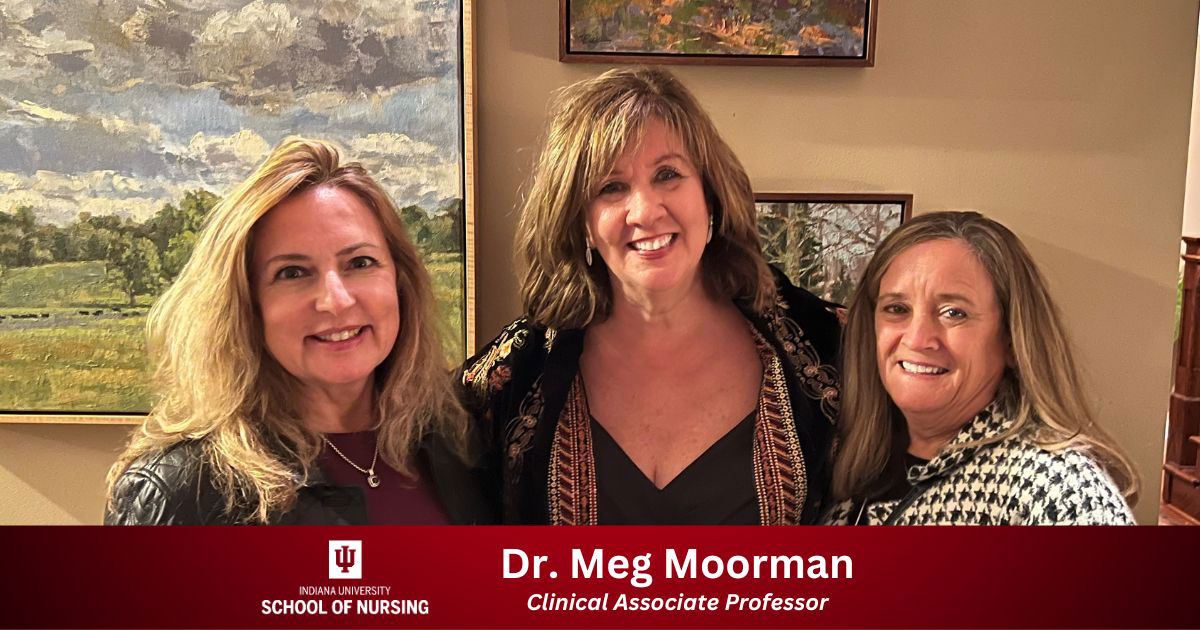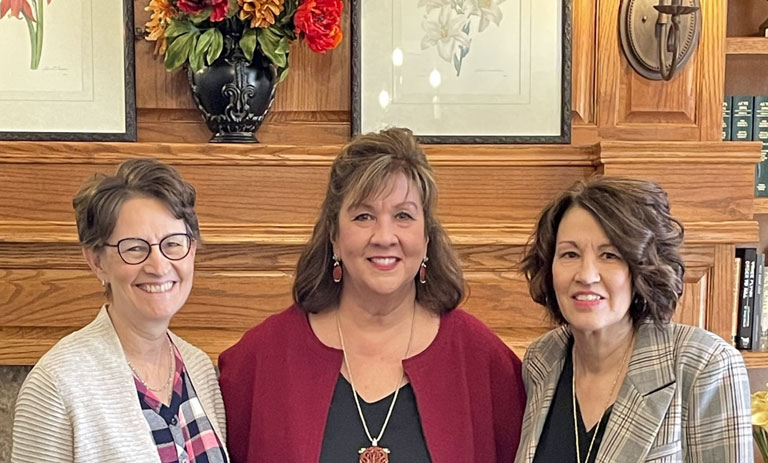Meet Meg Moorman, PhD, RN, ANEF, CNE, WHNP, Director of the Faculty Innovating for Nursing Education (FINE) Center, Coordinator of the Master of Science in Nursing (MSN) in Nursing Education Track, and Clinical Associate Professor in the Community and Health Systems Department at the IU School of Nursing. (She is pictured above in the middle.) Dr. Moorman worked in women's health and obstetrics – both in labor and delivery and surgery, then in clinics for IU Health as a Women's Health NP – for 30+ years in the Indianapolis area. She started teaching at the IU School of Nursing in 2007.
What initially drew you to Indiana University?
I graduated from IU in 1987 with my Bachelor of Science in Nursing (BSN) and got my Nurse Practitioner (NP) degree in 1996. IU has such a great reputation in the healthcare realm, and I always enjoyed having IU NP students in my clinical practice. I also loved teaching undergraduate IU students and wanted to make classroom learning more interesting and engaging, so being asked to teach here in 2007 was a great opportunity! I always found IU Nursing students to be very smart and exceptional leaders and thinkers, so I was excited to be part of our amazing faculty and staff!
What fascinates you most about the research you do?
I’ve always loved creating, painting, and sketching. I took an art history class and was fascinated by how much history and symbolism I learned through looking at art. You can learn so much about culture and history, so when I discovered that art can be used to teach observational skills, I was intrigued. Visual Thinking Strategies (VTS) is a teaching method using art that has been studied extensively in K-12, but it has more recently been studied in higher education. I was introduced to VTS in 2009 and was fascinated by how students who looked at art were so much more willing to participate and share their interpretations of paintings than they were to discuss patient care in the classroom. I began studying VTS as a learning method for teaching and have done several studies with it as an intervention. I’ve found that VTS helps increase observational skills in students and increase their ability to communicate those observations. It also has been found to increase teamwork and leadership skills by providing ways of questioning and gathering information, skills that transfer to patient care. More recently, we have been using art to help nursing students have conversations about diversity and health disparities, and artwork can give teachers opportunities to help students talk about difficult topics.
What do you want people to know about the School of Nursing that they might not know?
I am always impressed by how nurse educators care so much for their students. I think students would be surprised to know how their faculty really want them to do well and want to help them. I see my colleagues go so far out of their way for students, but students have to ask for help, too. I am also amazed at how brilliant our faculty are and how deep their knowledge about so many research topics is. We have faculty working on so many fascinating research topics in addition to their teaching! It is really inspiring!
What is most helpful advice you’ve ever received?
Try to dovetail your research and projects so that they are all related and they can build upon each other. I am fortunate that my area of research is nursing education and that I also am the Coordinator of the MSN in Nursing Education. All of my research is also nursing education-focused, so it all overlaps and informs my different roles.
Is there anything else you’d like to share?
I wish that more faculty would consider the use of art to help them teach. Art can be used to present difficult concepts and make them easier to understand. It can provide opportunities to have discussions about diversity, families, health disparities, climate change, and healthcare. Finally, students can practice conversations and increase their observational skills through art. I’m happy to consult with nurse educators about how art might present an interesting way to teach.




